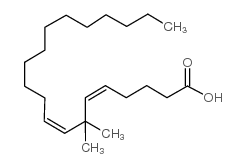Discussion of the role of the extracellular signal-regulated kinase-phospholipase A2 pathway in production of reactive oxygen species in Alzheimer's disease.
Jannike M Andersen, Oddvar Myhre, Frode Fonnum
Index: Neurochem. Res. 28(2) , 319-26, (2003)
Full Text: HTML
Abstract
In this paper we show that exposure of a rat brain synaptosome fraction to the amyloid beta peptide fragment betaA(25-35), but not the inverted peptide betaA(35-25), stimulated production of reactive oxygen species (ROS) in a concentration- and time-dependent manner. The ROS formation was attenuated by the tyrosine kinase inhibitor genistein, the mitogen-activated protein kinase inhibitor U0126, and the phospholipase A2 (PLA2) inhibitor 7,7-dimethyl-(5Z,8Z)-eicosadienoic acid. This strongly suggests that betaA(25-35) stimulated ROS production through an extracellular signal-regulated kinase-PLA2-dependent pathway. The interaction between these enzymes and their possible involvement in free radical formation in Alzheimer's disease are discussed.
Related Compounds
| Structure | Name/CAS No. | Molecular Formula | Articles |
|---|---|---|---|
 |
7,7-dimethyleicosadienoic acid
CAS:89560-01-0 |
C22H40O2 |
|
Exocytosis in chromaffin cells: evidence for a MgATP-indepen...
1994-05-15 [Biochem. J. 15 , 217-227, (1994)] |
|
Hyposmotically induced amino acid release from the rat cereb...
1999-10-09 [Brain Res. 844 , 1-9, (1999)] |
|
Phospholipase A2 is not responsible for lysophosphatidylchol...
1998-11-01 [Am. J. Physiol. 275(5 Pt 2) , H1782-7, (1998)] |
|
The effects of two phospholipase A2 inhibitors on the neurom...
1995-12-01 [Toxicon 33(12) , 1633-43, (1995)] |
|
Endothelin-induced prostacyclin production in rat aortic rin...
1996-11-01 [Prostaglandins Leukot. Essent. Fatty Acids 55(5) , 309-13, (1996)] |